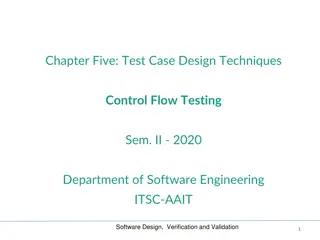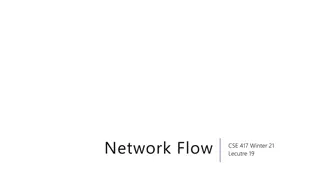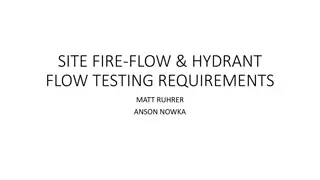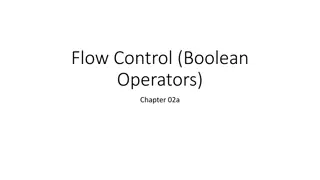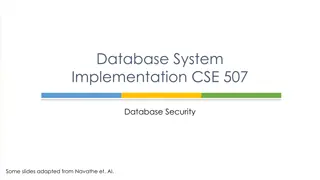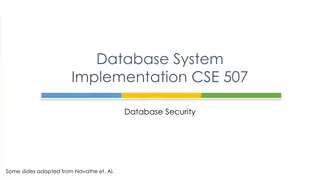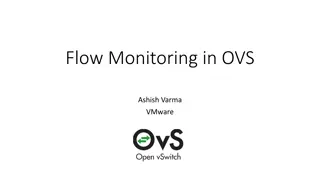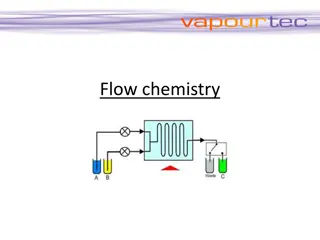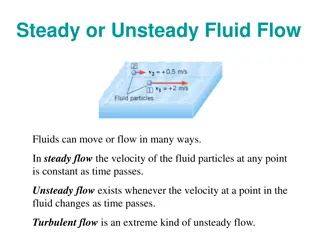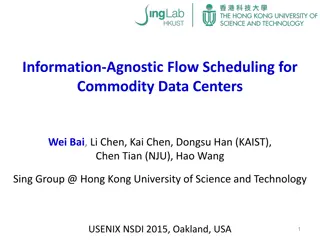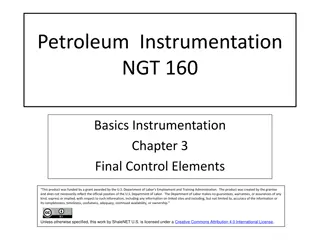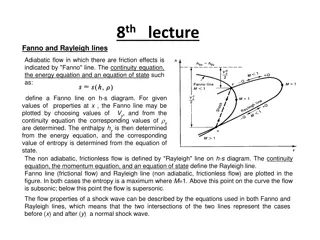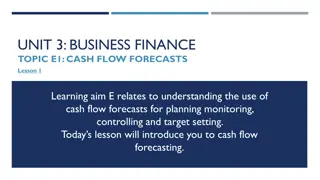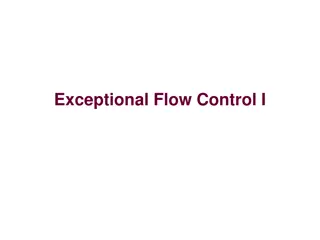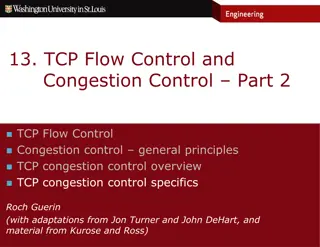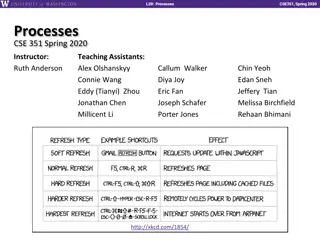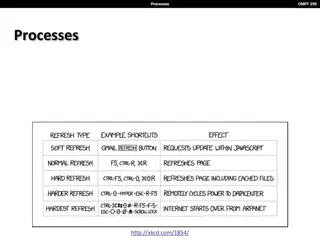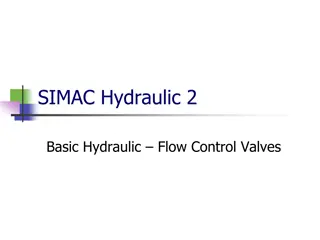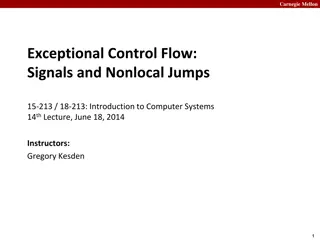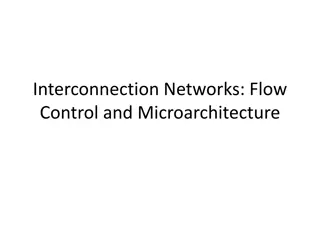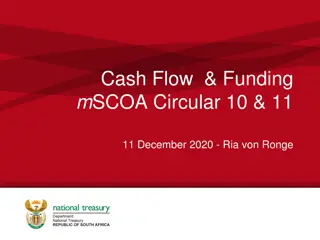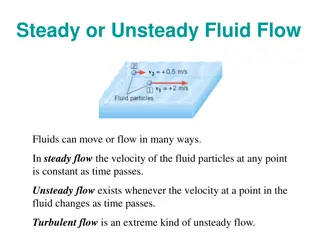Pest control in Kolkata
Are you looking for professional pest control services in Kolkata? Socspl.com is here to provide the most reliable and efficient pest control services in Kolkata. We have extensive knowledge and experience in handling all kinds of pest infestations such as termite control, cockroach control, ant con
1 views • 8 slides
Control Flow Testing Techniques in Software Design
Explore the significance of control flow testing in software design, focusing on path selection criteria, test case generation, and path execution. Learn how control flow testing helps in revealing defects efficiently and effectively, improving the overall quality of software systems.
1 views • 30 slides
The Psychology of Flow: Achieving Total Focus and Optimal Performance
Engage in activities for their intrinsic value, where the ego diminishes, and time seems to vanish - that's when flow occurs. This optimal psychological state involves deep concentration, clear goals, and a sense of control. By embracing challenges and staying in the present moment, one can cultivat
0 views • 13 slides
Understanding Runoff in Hydrology
Runoff in hydrology refers to surface water flow from precipitation and other sources in drainage basins. It plays a crucial role in stream flow and peak flood formation, influenced by factors like overland flow, interflow, and groundwater flow. This article explores the sources of runoff, including
1 views • 27 slides
Understanding Max Flow in Network Theory
In network theory, understanding the concept of maximum flow is crucial. From finding paths to pushing flow along edges, every step contributes to maximizing the flow from a source to a target in the graph. The process involves determining capacities, creating flows, and calculating the net flow ent
2 views • 41 slides
Fire Flow Requirements and Calculation Methods
Detailed information on site fire flow and hydrant flow testing requirements, how to calculate required fire flow, applicable codes and standards including NFPA and IBC, duration of fire flow, methodologies for fire flow calculation, and ISO methods and formulas.
3 views • 30 slides
Asian Pest Control - Professional Pest Management Services in Dhaka
Asian Pest Control offers top-quality pest control services in Dhaka, with a mission to be recognized as the best in the industry. Their highly trained professionals prioritize safety and environmental care while providing services like cockroach control, rodent control, snake repellent, lizard cont
1 views • 16 slides
Flow Measurement Using V-Notch and Weirs in Engineering
Flow measurement in engineering involves the use of V-notch and weirs, such as rectangular weirs and triangular weirs, to calculate discharge rates and velocity of liquids. A V-notch is a triangular obstruction used for flow measurement, while weirs are larger scale structures for measuring river or
1 views • 7 slides
Understanding Boolean Operators and Control Flow in Programming
Explore the world of Boolean operators and control flow in programming with this detailed chapter. Learn about comparison operators, boolean values, and the logical operators and, or, and not. Understand how these concepts are used to control the flow of your code through practical examples. Dive in
1 views • 10 slides
Importance of Cash Flow Analysis in Financial Management
Cash flow analysis is a crucial financial tool for effective cash management, aiding in evaluating financial policies and positions. It helps in planning, coordinating financial operations, assessing cash needs, and meeting obligations. However, it has limitations as it does not substitute the incom
1 views • 7 slides
Understanding the Importance of Flow Charts in System Processes
Flow charts are valuable tools that visually represent the flow of data and process steps within a system. They help define problems, sequence steps to solve them, and show alternatives if issues arise. By using standard symbols, flow charts facilitate communication between engineers and clients, ai
1 views • 35 slides
Introduction to Database Security and Countermeasures
Database security is essential to protect data integrity, availability, and confidentiality. Countermeasures such as access control, inference control, flow control, and encryption can safeguard databases against threats. Access control restricts user access, inference control manages statistical da
0 views • 26 slides
Database Security Measures and Controls
Database security is crucial to protect against threats like loss of integrity, availability, and confidentiality. Countermeasures such as access control, inference control, flow control, and encryption are important for safeguarding databases. Access control involves creating user accounts and pass
0 views • 35 slides
Understanding Fluid Flows in Fluid Mechanics
Fluid Mechanics is the study of fluids in motion or at rest, and their interactions with solids or other fluids. Fluid flows are classified based on various characteristics such as viscous versus inviscid regions, internal versus external flow, compressible versus incompressible flow, laminar versus
1 views • 16 slides
Understanding Flow Monitoring in OVS for Efficient Network Management
Learn how Flow Monitoring in Open vSwitch (OVS) allows controllers to track and manage changes to flow tables, enabling efficient network management. Explore topics such as Flow Mod programming, Flow Monitor messages, OVS support, monitoring vs. snoop, and practical examples of flow monitoring in ac
0 views • 9 slides
Understanding Marketing Control and Its Importance in Business
Marketing control is a crucial process for firms to evaluate the impact of their marketing strategies and initiatives, making necessary adjustments for better outcomes. It involves various aspects such as annual plan control, profitability control, efficiency control, and strategic control. The proc
0 views • 20 slides
Understanding Control Plans in Process Management
A Control Plan is vital in controlling risks identified in the FMEA process, focusing on process and product characteristics, customer requirements, and establishing reaction plans for out-of-control conditions. It serves as a central document for communicating control methods and includes key infor
1 views • 20 slides
Understanding Flow Chemistry for Efficient Chemical Reactions
Flow chemistry, also known as continuous flow or plug flow chemistry, revolutionizes chemical reactions by running them in a continuous flow stream. This dynamic process offers efficient manufacturing of chemical products with precise control over critical parameters like stoichiometry, mixing, temp
2 views • 7 slides
Fundamentals of Fluid Flow: Steady, Unsteady, Compressible, Incompressible, Viscous, Nonviscous
Fluid flow characteristics such as steady vs. unsteady, compressible vs. incompressible, and viscous vs. nonviscous play crucial roles in understanding how fluids behave in various scenarios. Steady flow entails constant velocities over time, while unsteady flow involves changing velocities. Liquids
0 views • 11 slides
Understanding Open Channel Flow and Mannings Equation
This review covers hydraulic devices such as orifices, weirs, sluice gates, siphons, and outlets for detention structures. It focuses on open channel flow, including uniform flow and varied flow, and explains how to use Mannings equation for calculations related to water depth, flow area, and veloci
0 views • 43 slides
Information-Agnostic Flow Scheduling: Minimizing FCT in Data Centers
This study explores information-agnostic flow scheduling for commodity data centers to minimize flow completion time (FCT) without prior knowledge of flow size. Existing solutions requiring prior flow size information are deemed infeasible for some applications and challenging to deploy in practice.
1 views • 46 slides
Understanding Internal Flow in Heat Transfer Processes
Exploring internal flow characteristics in heat transfer, we delve into topics like laminar flow, velocity profiles, Reynolds number, and entry lengths for different flow regimes. Images illustrate concepts such as fully developed velocity profiles and the impact of flow conditions on the mean veloc
0 views • 27 slides
Revolutionizing Sonographic Blood Flow Measurement with PixelFlux
Novelties in PixelFlux technology offer a groundbreaking approach to sonographic blood flow measurement, enabling precise and accurate flow volume calculations through innovative features such as three-dimensional Doppler angle correction, pixelwise flow analysis, and dynamic measurements throughout
0 views • 12 slides
Understanding Children with Special Needs and Parenting Challenges
Children with special needs deviate from the average in various aspects, requiring special provisions in education and adjustment. Categories include intellectually exceptional, sensory exceptional, orthopaedic impaired, socially or emotionally exceptional, communication disorder, learning or academ
0 views • 23 slides
Understanding Max-Flow and Min-Cut Problems in Graph Theory
This collection covers the concepts of max-flow and min-cut in directed graphs, focusing on moving water or data packets from a source to a target vertex within given capacities. It explains flow values, finding optimal solutions, and strategies for maximizing flow networks. The visuals aid in grasp
0 views • 58 slides
Basics of Final Control Elements in Fluid Flow Systems
Final control elements play a crucial role in regulating flow rates within fluid flow processes. Valves, controlled-volume pumps, and variable-speed pump drives are key components. Valves consist of various parts like the body, plug, guides, and seats. Different types of valves, such as single-porte
0 views • 31 slides
Understanding Fanno and Rayleigh Lines in Adiabatic Flow
Fanno and Rayleigh lines on the h-s diagram help in analyzing adiabatic flow with friction effects. The Fanno line represents frictional flow, while the Rayleigh line signifies non-adiabatic, frictionless flow. These lines aid in plotting flow properties and understanding phenomena like shock waves
0 views • 6 slides
Ford-Fulkerson Algorithm for Maximum Flow in Networks
The Ford-Fulkerson algorithm is used to find the maximum flow in a network by iteratively pushing flow along paths and updating residual capacities until no more augmenting paths are found. This algorithm is crucial for solving flow network problems, such as finding min-cuts and max-flow. By modelin
0 views • 26 slides
Understanding Cash Flow Forecasts in Business Finance
This lesson introduces cash flow forecasting in business finance, outlining the importance of predicting, monitoring, controlling, and setting targets for cash flow. It covers key terms, purpose of cash flow forecasting, cash inflows and outflows, and the structure of cash flow forecasts. Students w
0 views • 10 slides
Understanding Exceptional Control Flow in Computer Systems
Control flow mechanisms in computer systems have evolved to handle exceptional events triggered by external system states. This includes exceptions, interrupts, and context switches that enable the CPU to respond to events like data arrival, user inputs, and system timeouts. Exception handling invol
0 views • 66 slides
Understanding TCP Flow Control and Congestion Control Variants
The text delves into TCP flow control and congestion control mechanisms, focusing on TCP Tahoe and Reno variants. It explains the sender-side congestion control algorithms, such as AIMD, slow start, and fast recovery. Details of TCP variants like BIC and CUBIC are also discussed, highlighting their
0 views • 29 slides
Challenges of Flow Rate Fairness in Network Resource Allocation
Addressing the concept of flow rate fairness in network resource allocation, this content explores its limitations and challenges. Despite being a goal in protocols like TCP, the practicality and enforceability of flow rate fairness are questioned. It highlights the inadequacy of flow rate as a meas
0 views • 15 slides
Overview of CSE 351 Processes in Spring 2020
Processes in CSE 351 Spring 2020 cover topics like memory management, control flow, system components, and exceptional control flow. The course includes hands-on labs, assignments, and lectures focusing on memory allocation, Java vs. C, assembly language, processors, and more. Students are required
0 views • 44 slides
Understanding Control Flow in Computer Systems
Explore the intricacies of control flow within computer systems, from the basics of processors executing instructions to handling exceptional control flow scenarios like interrupts and traps. Learn how control is transferred between processes and the operating system, the role of multi-process appli
0 views • 26 slides
Understanding Exceptional Control Flow in Computer Systems
Exceptional control flow in computer systems involves mechanisms such as exceptions, process context switches, signals, and nonlocal jumps to handle changes in system state or events. These mechanisms allow for efficient responses to events like data arriving from external sources, user interactions
0 views • 66 slides
Basic Hydraulic Flow Control Valves Overview: Types and Functions
Basic Hydraulic Flow Control Valves play a crucial role in regulating fluid flow in hydraulic systems. This comprehensive guide covers various types of flow control valves such as throttle valves dependent on viscosity, meter-in/meter-out/bypass flow control valves, and more. Learn about their funct
0 views • 15 slides
Understanding Multitasking and Exceptional Control Flow in Computer Systems
Explore the intricacies of multitasking and exceptional control flow in computer systems as taught in Carnegie Mellon's 15-213/18-213 course. Delve into topics like signals, nonlocal jumps, bits, bytes, integers, floats, assembly, stack discipline, cache linking, process context switch, hardware tim
0 views • 44 slides
Understanding Interconnection Networks, Flow Control, and Microarchitecture
Interconnection networks play a crucial role in determining the flow control and routing paths within a network, impacting throughput and latency. Different switching techniques like circuit-switching, packet-based, and flit-based control the allocation of resources at various granularities. Circuit
0 views • 41 slides
Municipal Cash Flow Management Challenges and Solutions
The circular issued highlights challenges faced by municipalities in managing cash flow information correctly, including errors in using mSCOA segments and linking MBRR cash flow tables. The data strings used for budgeting, transacting, and reporting cash flow are discussed, covering cash receipts,
0 views • 23 slides
Understanding Fluid Flow: Steady vs. Unsteady, Compressible vs. Incompressible, Viscous vs. Nonviscous
Fluid flow can be categorized into different types such as steady or unsteady, compressible or incompressible, and viscous or nonviscous. Steady flow maintains constant velocity over time, while unsteady flow involves changing velocities. Liquids are typically incompressible, whereas gases can be co
0 views • 12 slides

